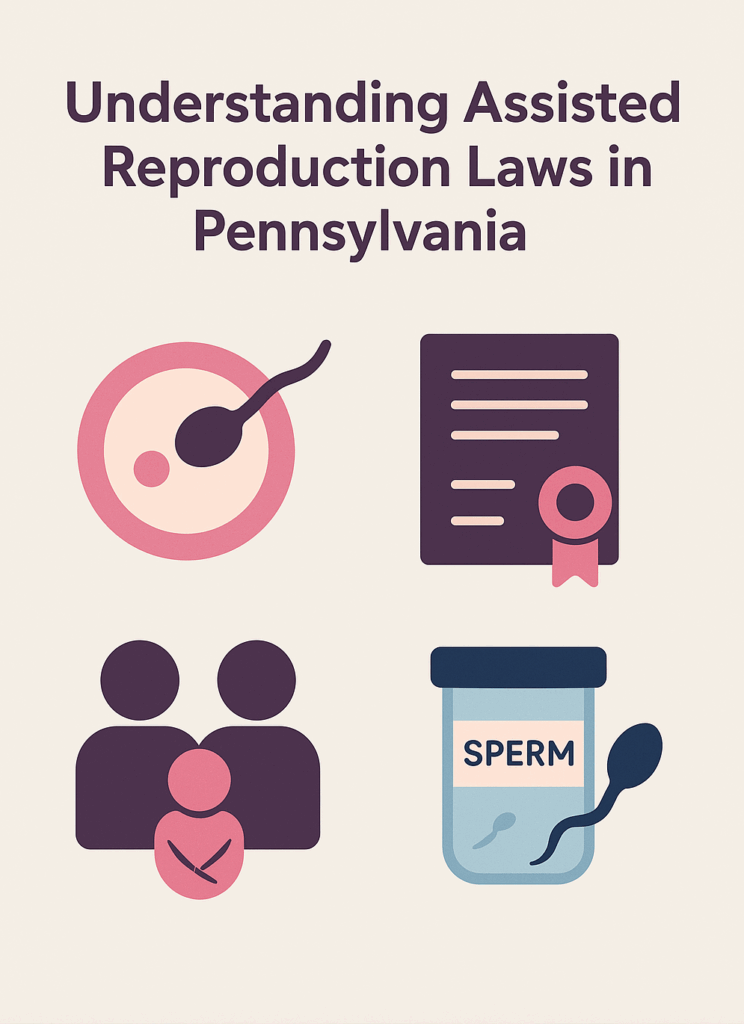In recent decades, assisted reproductive technology (ART) has transformed family building. From in vitro fertilization (IVF) to surrogacy and gamete donation, these fertility treatments have offered new paths to parenthood for infertile couples, LGBTQ+ families, and single individuals. While science has advanced quickly, assisted reproduction laws in Pennsylvania have developed primarily through case law rather than formal statutes, which can create uncertainty. For families in Philadelphia and across Southeastern Pennsylvania, understanding the legal framework is essential before beginning the process.

What Is Assisted Reproductive Technology (ART)?
Assisted reproductive technology refers to medical procedures that help people conceive. This includes IVF, egg donation, sperm donation, embryo transfer, and surrogacy. ART clinics coordinate these services with professionals in reproductive medicine and fertility treatment.
Unlike many European countries that regulate ART under national laws, the United States handles ART primarily at the state level. In Pennsylvania, there are no specific statutes governing surrogacy. Instead, surrogacy is permitted through case law and court recognition.
Parentage Orders and Legal Parental Status
Determining who qualifies as a legal parent is often the most important issue in assisted reproduction. In Pennsylvania, intended parents can be recognized as the legal parents through a pre-birth parentage order. This order, usually obtained during the second trimester, ensures the intended parents — not the surrogate — are listed on the child’s birth certificate.
Pennsylvania courts allow flexibility when issuing parentage orders. An order can be obtained if only the intended parents live in Pennsylvania, if only the carrier lives in Pennsylvania, or even if only the child’s birth occurs in the state.
The law allows both genetic and non-genetic parents to be named on a birth certificate. Intended parents do not have to be married, and single intended parents may also pursue surrogacy. Pennsylvania is considered favorable toward LGBT families, and the Pennsylvania Supreme Court has affirmed legal parentage for children born through assisted reproduction, including recognition of lesbian mothers.
Surrogacy in Pennsylvania
Surrogacy agreements are enforceable in Pennsylvania under case law, though no statute explicitly governs them.
- Gestational surrogacy: Gestational surrogates have no genetic link to the child, and courts commonly grant pre-birth orders giving intended parents full parental rights from the moment of birth.
- Traditional surrogacy: The surrogate provides her own egg, making her genetically related to the child. Pennsylvania does not provide specific legal protection for traditional surrogacy, and intended parents must complete a post-birth adoption to secure legal rights.
Compensated and non-compensated surrogacy are both permitted. Pennsylvania allows reimbursements to gestational carriers without restriction, and surrogacy contracts typically cover medical procedures, insurance coverage, responsibilities, and the intent to parent.
Donors, Sperm Donation, and Artificial Insemination
Gamete donors — whether egg, sperm, or embryo — usually do not have parental rights if the donation is made through a licensed ART clinic with proper documentation. However, in informal arrangements or cases involving known donors, courts may look at written agreements, donor intent, and involvement with the child.
Artificial insemination and sperm donation are common forms of ART. Donated sperm handled through licensed ART clinics or sperm banks — which collect, freeze, and preserve human tissues — does not create parental rights for the donor. If artificial insemination occurs outside a clinic, the law is less clear, and courts may examine the circumstances. Families are strongly advised to consult an attorney before proceeding.
Frozen Embryo Disputes
Disagreements about frozen embryos are among the most complex issues in ART. In Pennsylvania, embryos are treated as marital property during divorce proceedings. Pre-existing contracts typically guide their disposition, but courts may also apply different approaches:
- Contractual approach: respects prior written agreements.
- Mutual consent approach: requires both parties to agree.
- Balancing approach: considers the rights and preferences of each party.
Regulatory Authorities for ART Clinics
Fertility clinics in Pennsylvania must submit quarterly IVF reports to the Department of Health. On the national level, the Centers for Disease Control and Prevention (CDC) collects ART success rates, and the Food and Drug Administration (FDA) regulates the screening and safety of reproductive tissues. Medical licensing boards ensure that only qualified practitioners provide ART services in the United States.
Professional oversight also comes from organizations such as the American Society for Reproductive Medicine (ASRM) and the Society for Assisted Reproductive Technology (SART), which issue ethical and practice guidelines.
Globally, countries approach ART regulation differently. For example, India enacted the Assisted Reproductive Technology (Regulation) Act, 2021, which mandates licensing, supervision, and protections for surrogate mothers and infertile couples, and creates a national ART registry for research and policy.
ART and Family Building
Assisted reproductive technology plays a central role in family building today. It allows couples facing infertility, same sex couples, and single intended parents to pursue parenthood.
- The most widely used method of ART is IVF.
- About one in every hundred babies born in the United States is conceived through ART.
- Infertility affects 10 to 15 percent of couples worldwide.
- Egg donation typically involves the intended parents obtaining all the eggs from one or several retrieval cycles, which then become their property.
- Sperm banks preserve donated sperm samples for future use.
The Uniform Parentage Act, adopted in some states, ensures that all children have equal rights regardless of their parents’ marital status. Pennsylvania courts recognize ART-related child custody issues and may use contractual, mutual consent, or balancing approaches to resolve disputes. Because ART laws are rapidly changing, families should seek ongoing legal guidance.
Protecting Your Rights
Whether you are an intended parent, a single individual, or an LGBTQ+ couple, your parental rights are too important to leave uncertain. While Pennsylvania is considered favorable to ART and surrogacy, the best protection comes from careful contracts, properly filed parentage orders, and proactive legal planning.
At Cooper Family Law, we help families in Philadelphia and across Southeastern Pennsylvania secure their rights in assisted reproduction matters. From surrogacy agreements to sperm donor arrangements, our assisted reproductive technology attorneys provide trusted legal guidance tailored to your family’s needs.
Assisted Reproduction Laws in Pennsylvania FAQs
ART includes medical procedures such as IVF, egg or sperm donation, embryo transfer, and surrogacy arrangements that help individuals or couples conceive.
IVF is permitted in Pennsylvania, and insurance coverage for infertility diagnosis and IVF procedures is mandated, subject to a $15,000 lifetime maximum in benefits. Fertility clinics must also report IVF data to the Pennsylvania Department of Health.
Assisted reproduction refers to medical procedures that use reproductive tissues, gamete donation, or embryo transfer to achieve pregnancy. It may involve intended parents, donors, and sometimes a gestational carrier.
Generally, sperm donors do not have parental rights when donations occur through licensed clinics with proper documentation. In informal arrangements, courts may examine agreements and intent.
Legal issues may include enforcing surrogacy contracts, determining parental rights, resolving frozen embryo disputes, and addressing custody or inheritance. Ethical and financial concerns can also arise.
Reproductive technologies can be costly, emotionally challenging, and medically risky. They may also raise legal complexities if contracts or parentage orders are not properly in place.
Parents in Pennsylvania and across the U.S. have constitutionally protected rights to make decisions about the care, custody, and upbringing of their children. ART cases must balance these rights with state law and private agreements.










